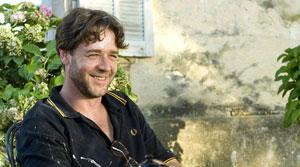
A Good Year (Ridley Scott, 2006)
If there was one adjective to describe the viewing experience that was Ridley Scott's A Good Year, it would've been "uncomfortable." Despite the relaxing visuals trustworthy Scott has afforded us (the golden sunlit fields of Provence, the rustic and gorgeously aged chateau, the beautiful and near-perfect Marion Cotillard), there's that feeling that things and sensations are out of place in the movie. Scott is a skilled craftsman. He after all has made plenty of films in different genres with surprising ease and understandable success. He has made historical epics (Gladiator (2000) and Kingdom of Heaven (2005)), war films (Black Hawk Down (2001)), heist-comedy (Matchstick Men (2003)), buddy road movie (Thelma and Louise (1991)), suspense-horror (Alien (1979) and Hannibal (2001)), dystopian sci-fi (Blade Runner (1982)), fantasy (Legend (1985)) and some other flicks that can't simply be boxed in a particular genre (G.I. Jane (1997)). A Good Year is a rom-com with hints of European art flick (in its most pedestrian sense --- think Cinema Paradiso (Giuseppe Tornatore, 1988) or all those other Academy-loved French swooners) and a tad inspiration from the genre that Sideways (Alexander Payne, 2004) resurfaced (the wine-film). Still infused with Scott's technical expertise, A Good Year just can't get past the boundaries of genre-discomfort, and thus, just couldn't work.
A Good Year is adapted from Scott's long-time friend Peter Mayle's novel, which was supposedly truncated and modified to fit Scott's creative impulses. It tackles Max Skinner (Russell Crowe), a ruthless and proudly dishonest stocks trader, who is forcedly sent to Provence to receive his inheritance from reclusive uncle Henry (Albert Finney). Through constant flashbacks, we learn of Max's experience during the summers he spent with his uncle in the latter's vineyard --- which now produces undrinkable and bad-tasting wine. Max plans to sell the vineyard for what it's worth, while flirting with village beauty-and-cafe waitress Fanny Chenal (Cotillard). Things get complicated when Christie Roberts (Abbie Cornish), Henry's offspring from a California fling, surface.
Russel Crowe, that rugged man who's diverted audiences from his off-screen asshole-ness by playing a heroic schizo-mathematician and aging boxing champ, is no Hugh Grant, who despite his off-screen persona of being a whore-loving chap has transcended into celluloid rom-com royalty. Crowe simply can't do physical comedy without looking awkward and artificial. His smooth-talking and anti-genuine romantic quips can't be fathomed from an objective point-of-view. A Good Year, being a Crowe-starrer suffers because of this. A more convincing and sympathetic actor (or if Crowe just tried harder by not looking as embarrassed as he already is) could've made wonders to this Provencal time-passer.
A sideplot involving a fabled bottled wine was completely forgotten when the film enters its last third. The plot simply floats like a drunken butterfly, unable to control which way it wanted to go, finally landing an ending out of mere convenience. It's all shiny and fuzzy, probably like the golden mornings which are so beautifully shot by Scott's cinematographer Philippe Le Sourd (his experience in lighting and framing French films made A Good Year's look genuine --- probably the only thing genuine in this feel-good flick). However, the film's gorgeous visuals can't remove that distinct bad taste of talented artists trying so hard to fit into a nebulous genre. It also doesn't help that the film is populated with art film tropes --- the hardworking French laborer, his sassy wife, his aging father for comic relief, and his annoyingly over-present canine for further and unneeded comic relief.







wm.jpg)
























.png)



1 comment:
Ugh! Stfu! I love this movie. I think it's wonderful and really enjoyable. Russell (it's two freaking Ls idiot!) is excellent as always and he's NOT an asshole in rl. Quit reading the goddamn tabloids and gossip blogs plz. You don't even know him or met him personally, how can you say that? You're just one of those filmsnobs who thinks they're smarter than anyone. You suck!
Post a Comment